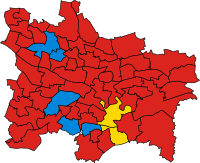City of Glasgow (1975–1996) facts for kids
| City of Glasgow | |
 Glasgow district's wards in 1984 |
|
| Geography | |
| Status | District |
| HQ | Glasgow City Chambers |
| History | |
| Created | 1975 |
| Abolished | 1996 |
| Succeeded by | Glasgow City Council |
Quick facts for kids Demography |
|
|---|---|
| 1994 population | 681,470 |
| Politics | |
| Governance | City of Glasgow District Council |
The City of Glasgow (also known as Baile Ghlaschu in Scottish Gaelic) was a special area in Scotland that had its own local government from 1975 to 1996. It was part of a bigger area called the Strathclyde region.
Contents
How Glasgow Was Governed
From 1975 to 1996, Scotland was divided into large areas called 'regions' and smaller areas called 'districts'. The City of Glasgow was one of 19 districts in the Strathclyde region. This region was very important because more than half of Scotland's population lived there.
The Glasgow district mostly covered the city of Glasgow. Before 1975, Glasgow had been managed by its own group, the Glasgow Corporation, since 1893.
Changing Glasgow's Borders
A law called the Local Government (Scotland) Act 1973 created the City of Glasgow district. This law changed the city's borders. It added nearby areas like the historic town of Rutherglen and its surroundings, plus Cambuslang. These towns had previously tried to stay separate from Glasgow.
The new district included:
- The city of Glasgow itself.
- The town of Rutherglen.
- Parts of Lanarkshire, including areas like Bankhead, Cambuslang, Hallside, Baillieston, Garrowhill, Mount Vernon, Carmyle, and Springboig.
Glasgow's Size and Importance
Glasgow was Scotland's largest city, with about 680,000 people. This made its district much bigger than others. For example, Edinburgh had around 410,000 people, and Aberdeen had about 210,000.
Glasgow was also the main city of the powerful Strathclyde region. The district's main offices were at Glasgow City Chambers. The Strathclyde Regional Council offices were also nearby.
Glasgow's Comeback
During the 20 years that the district existed, Glasgow changed a lot. It moved from a time of economic problems and a less-than-great reputation. The city worked hard to become a modern place and a popular spot for tourists.
This change was helped by:
- The "Glasgow's miles better" campaign, which was a marketing effort to improve the city's image.
- The success of the Glasgow Garden Festival in 1988, a big event that attracted many visitors.
- Glasgow being named the European City of Culture in 1990, which showed its importance in arts and culture.
The End of the District
In 1994, a new law called the Local Government etc. (Scotland) Act 1994 changed how local government worked again. All the districts and regions were removed.
The City of Glasgow district became the Glasgow City unitary council area. This new area had mostly the same borders as the old district. However, Cambuslang and Rutherglen (which included four wards) were moved to South Lanarkshire. This change happened after people in those areas voted for it.
See also
- Glasgow (European Parliament constituency)
- Politics of Glasgow
- Subdivisions of Scotland
 | William L. Dawson |
 | W. E. B. Du Bois |
 | Harry Belafonte |

